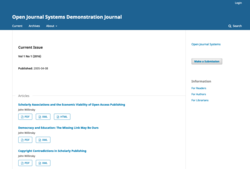Open Journal Systems
| Open Journal Systems
|
|
|---|---|

|
|
 Management and publication of digital magazines |
|
| Basic data
|
|
| developer | Public Knowledge Project |
| Current version |
3.2.1-1 ( June 27, 2020 ) |
| operating system | Linux, Windows Server |
| programming language | PHP , Smarty |
| License | GNU GPLv3 |
| pkp.sfu.ca/ojs | |
Open Journal Systems (OJS) is open source software for managing and publishing scientific journals . It is mainly used for open access journals.
construction
The software provides functions for three main areas of working with scientific journals: OJS enables you to leaf through published content using various aids via the reader interface. An editorial system allows processes such as the submission of manuscripts by authors, the award of review orders, and the review and layout of articles to be managed online. In the background of OJS, a relational database system with numerous interfaces for import and export ensures flexible input and reuse of metadata for search systems.
Reader interface
The reader interface enables users to get a reading experience similar to the printed editions with the help of chronologically arranged journal archives and tables of contents of the individual issues. In addition, a number of reading tools have been developed to increase reader engagement. These make it possible, for example, to comment on articles or share references to interesting articles via email. It is also possible to export citation styles to reference management programs.
The reader interface can be expanded by inserting simple static websites for text and images as well as various plugins.
Web-based editorial system
OJS provides the technical infrastructure to publish magazine issues and articles online. It is possible to use the software to manage the entire editorial organization, from submitting contributions to a multi-stage review process, to graphical preparation and final publication.
This is made possible by a structured concept of practice-oriented user roles : In OJS, different people work together in different functions. In the program, they are assigned a user group appropriate to their tasks, which enables them to use the functions they need for their work. The roles particularly include journal managers, editors, reviewers, authors and readers. In this way evaluation procedure (to peer review ) organized and editorial processes are structured.
In addition to the implementation of freely accessible open access journals, OJS also supports a subscription model. This enables the implementation of delayed article release (so-called moving wall models ) and fully subscription-based access rights. Individual subscriptions for individuals and institutional subscription activation can be set up using IP addresses .
Data storage and interfaces for article metadata
There are plug-ins that facilitate the indexing of journal content in Google Scholar and PubMed Central . In addition, various import formats are available for feeding in retro-digitized magazines, for example.
Open Journal Systems also supports LOCKSS to ensure long-term archiving and uninterrupted access to journal content.
Multilingualism
OJS has been translated into a variety of languages, version 2.3 is completely available in 16 languages (Bulgarian, Czech, Danish, Dutch, English, Farsi, French, German, Greek, Indonesian, Italian, Japanese, Portuguese, Spanish, Turkish, Ukrainian) , a number of other languages are also introduced (including Arabic, Chinese, Hindi and Vietnamese). All translations are created and managed by members of the community.
development
OJS was first published in 2001. The software is written in PHP and uses a MySQL or PostgreSQL database and can be run on Unix or Windows web servers. The Smarty template engine is used to display the user interface.
The software was developed by the Canadian Public Knowledge Project and is published under the GNU General Public License . It is mainly used by open access journals . At the end of 2013 there were over 7000 active OJS-operated journals in a multitude of languages worldwide; in German-speaking countries there are around 200 OJS journals.
An active community has developed around OJS, whose members, in addition to the developments of the Public Knowledge Project (PKP), are working on expanding and improving it. Extensive and constantly growing documentation is available on the PKP website.
The software has a plug-in architecture so that new functionalities can be integrated without having to restructure the entire code base.
The OJS 3.0 version was released in August 2016 and featured significantly refactored code and extensively redesigned user interfaces ; The release OJS 3.1.0 appeared in October 2017.
Examples
The Forum Qualitative Sozialforschung (FQS), a multilingual online journal for qualitative social research and the world's largest freely available journal on qualitative methods, is published with OJS. A large number of the journals in the Directory of Open Access Journals are also operated with OJS.
The Heidelberg University Library publishes around 30 journals operated with OJS. The Freie Universität Berlin also operates a large number of journals with OJS. In addition, other universities and libraries are setting up their own OJS hosting offers for their own or external journals.
Web links
Individual evidence
- ↑ github.com .
- ↑ github.com . (accessed on July 26, 2020).
- ^ OJS Languages . In: Public Knowledge Project . Retrieved August 21, 2013.
- ↑ OJS documentation . In: Public Knowledge Project . Retrieved January 14, 2015.
- ↑ Public Knowledge Project , start page Open Journal Systems . Retrieved November 29, 2017.
- ^ OJS Heidelberg . In: Heidelberg University Library . Retrieved January 14, 2015.
- ^ OJS FU Berlin . In: Free University of Berlin . Archived from the original on June 21, 2013. Info: The archive link was inserted automatically and has not yet been checked. Please check the original and archive link according to the instructions and then remove this notice. Retrieved January 14, 2015.